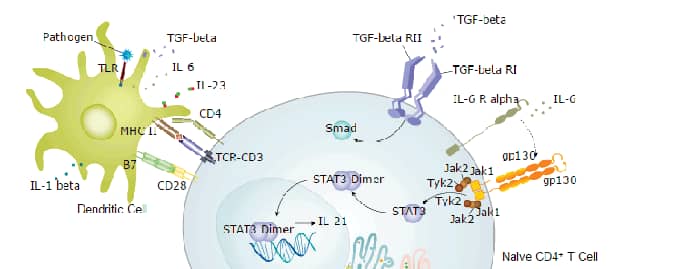Recombinant Human B7-2/CD86 Fc Chimera (CHO-expressed), CF
Recombinant Human B7-2/CD86 Fc Chimera (CHO-expressed), CF Summary
Product Specifications
| Human B7-2/CD86 (Leu20-His239) Accession # AAB03814.1 |
DIEGRMD | Human IgG1 (Pro100-Lys330) |
| N-terminus | C-terminus | |
Analysis
Product Datasheets
Carrier Free
CF stands for Carrier Free (CF). We typically add Bovine Serum Albumin (BSA) as a carrier protein to our recombinant proteins. Adding a carrier protein enhances protein stability, increases shelf-life, and allows the recombinant protein to be stored at a more dilute concentration. The carrier free version does not contain BSA.
In general, we advise purchasing the recombinant protein with BSA for use in cell or tissue culture, or as an ELISA standard. In contrast, the carrier free protein is recommended for applications, in which the presence of BSA could interfere.
7625-B2
| Formulation | Lyophilized from a 0.2 μm filtered solution in PBS. |
| Reconstitution | Reconstitute at 100 μg/mL in PBS. |
| Shipping | The product is shipped at ambient temperature. Upon receipt, store it immediately at the temperature recommended below. |
| Stability & Storage: | Use a manual defrost freezer and avoid repeated freeze-thaw cycles.
|
Reconstitution Calculator
Background: B7-2/CD86
B7-2, also known as CD86, B70, and ETC-1, is a 60-100 kDa variably glycosylated protein in the B7 family. B7 family members are transmembrane cell surface molecules that play important roles in immune activation and the maintenance of immune tolerance (1, 2). Mature human B7-2 consists of a 224 amino acid (aa) extracellular domain (ECD) with two Ig-like domains, a 21 aa transmembrane segment, and a 61 aa cytoplasmic tail (3, 4). Within the ECD, human B7-2 shares 59% aa sequence identity with mouse and rat B7-2. Alternative splicing of human B7-2 generates additional isoforms that lack both Ig-like domains or a region that includes the transmembrane segment. B7-2 is highly expressed on activated antigen presenting cells (APC), e.g. B cells, dendritic cells, and monocytes (4-7), as well as on vascular endothelial cells (8). B7-2 and the closely related B7-1/CD80 exhibit overlapping but distinct functional properties. Their binding to CD28, which is constitutively expressed on T cells, enhances T cell receptor signaling and also provides TCR-independent co-stimulation (3-5, 7, 9-11). B7-1 and B7-2 additionally bind the CD28-related protein, CTLA-4, which is up‑regulated and recruited to the immunological synapse (IS) at the onset of T cell activation (3-5, 7, 9, 10). CTLA-4 ligation inhibits the T cell response and supports regulatory T cell function (12). B7-2 is expressed earlier than B7-1 following APC activation (6), and both proteins bind with higher affinity to CTLA-4 than to CD28 (10). B7-2 promotes the stabilization of CD28 in the IS, while B7-1 is primarily responsible for promoting CTLA-4 recruitment and accumulation in the IS (13). The relative participation of B7-1 and B7-2 in T cell co-stimulation can also alter the Th1/Th2 bias of the immune response (14). Both B7-1 and B7-2 serve as cellular receptors for B species adenoviruses (15).
- Greenwald, R.J. et al. (2005) Annu. Rev. Immunol. 23:515.
- Bour-Jordan, H. et al. (2011) Immunol. Rev. 241:180.
- Freeman, G.J. et al. (1993) Science 262:909.
- Azuma, M. et al. (1993) Nature 366:76.
- Freeman, G.J. et al. (1993) J. Exp. Med. 178:2185.
- Lenschow, D.J. et al. (1993) Proc. Natl. Acad. Sci. USA 90:11054.
- Hathcock, K.S. et al. (1993) Science 262:905.
- Seino, K. et al. (1995) Int. Immunol. 7:1331.
- Chen, C. et al. (1994) J. Immunol. 152:4929.
- Lanier, L.L. et al. (1995) J. Immunol. 154:97.
- Rudd, C.E. et al. (2009) Immunol. Rev. 229:12.
- Wing, K. et al. (2011) Trends Immunol. 32:428.
- Pentcheva-Hoang, T. et al. (2004) Immunity 21:401.
- Kuchroo, V.K. et al. (1995) Cell 80:707.
- Short, J.J. et al. (2006) Virus Res. 122:144.
FAQs
No product specific FAQs exist for this product, however you may
View all Proteins and Enzyme FAQsReviews for Recombinant Human B7-2/CD86 Fc Chimera (CHO-expressed), CF
Average Rating: 5 (Based on 1 Review)
Have you used Recombinant Human B7-2/CD86 Fc Chimera (CHO-expressed), CF?
Submit a review and receive an Amazon gift card.
$25/€18/£15/$25CAN/¥75 Yuan/¥2500 Yen for a review with an image
$10/€7/£6/$10 CAD/¥70 Yuan/¥1110 Yen for a review without an image
Filter by:





